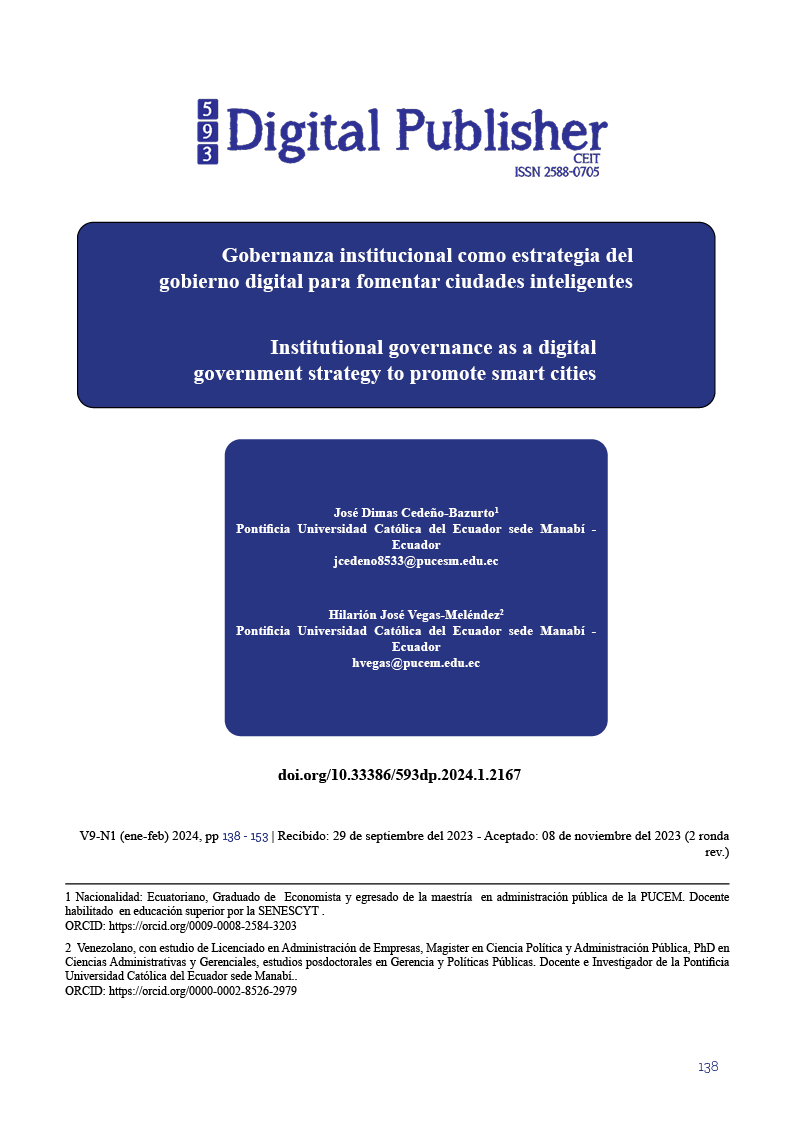Institutional governance as a digital government strategy to foster smart cities
Main Article Content
Abstract
The purpose of this research is to interpret the theoretical position on institutional governance that facilitates the design of a smart city from the perspective of digital government; this purpose is accompanied by the following guidelines: to contextualize the postulates of institutional governance from a digital concept, and to reflect on the smart city from the perspective of digital government. Its design is based on a documentary, analytical-bibliographic study; its paradigm is a phenomenological-descriptive approach, with a qualitative perspective, supported by an inductive-deductive method; the instruments for collecting information have been direct observation in the main governmental institutions of the city of Manta, under the notebook modality; as well as the application of in-depth interviews to academic experts and researchers knowledgeable about the topics covered: Institutional governance, digital government and smart cities. The analysis strategy has been the documentary one, and the application of the hermeneutic method proposed by Gadamer. Among the findings, product of the categorization, there are three aspects: a) Components that allow measuring performance, comparing and improving public policies from the structure of institutional governance. b) Smart infrastructure for a digital government, and c) Sustainable development as the ultimate goal of smart cities; obtaining an idea of good praxis called: Institutional governance as a digital government strategy to promote smart cities.
Downloads
Article Details

This work is licensed under a Creative Commons Attribution-NonCommercial-ShareAlike 4.0 International License.
1. Derechos de autor
Las obras que se publican en 593 Digital Publisher CEIT están sujetas a los siguientes términos:
1.1. 593 Digital Publisher CEIT, conserva los derechos patrimoniales (copyright) de las obras publicadas, favorece y permite la reutilización de las mismas bajo la licencia Licencia Creative Commons 4.0 de Reconocimiento-NoComercial-CompartirIgual 4.0, por lo cual se pueden copiar, usar, difundir, transmitir y exponer públicamente, siempre que:
1.1.a. Se cite la autoría y fuente original de su publicación (revista, editorial, URL).
1.1.b. No se usen para fines comerciales u onerosos.
1.1.c. Se mencione la existencia y especificaciones de esta licencia de uso.
References
AENOR. (2016). Ciudades inteligentes. Definición Atributos y requisitos.
AENOR. https://www.aenor.com/certificacion/administracion-publica/ciudad-inteligente-indicadores
Archenti, N., y Piovani, J. (2007). Los debates metodológicos contemporáneos. En A., Marradi, Archenti, N. y J. Piovani. Metodología de las ciencias sociales. Editorial Emecé
Banco Mundial (2020). La gobernanza mundial. Informe 2020. https://www.bancomundial.org/es
Banco Mundial (1989). La gobernanza mundial. Informe 1989. https://www.bancomundial.org/es
Barros, A., T. Campero y P. Cabello (2016). Estudio para una gobernanza digital en Chile, Santiago. Publicaciones del Ministerio de Hacienda/Ministerio Secretaría General de la Presidencia. En línea: https://repositorio.cepal.org/bitstream/handle/11362/47018/1/S2100258_es.pdf
Bouskela, M. & Elnir, H. (2018). Construyendo ciudades inteligentes en América Latina y el Caribe. Banco Interamericano de Desarrollo (BID). https://blogs.iadb.org/ciudadessostenibles/es/ciudadesinteligentes-smartcities-americalatinacaribe/
Breton, P. y Proulx, S. (2002), L’explosion de la communication à l’aube du xxIe siècle, Ed. Boréal.
Cabello S. (2022). El camino de desarrollo de las ciudades inteligentes Una evaluación de Bogotá, Buenos Aires, Ciudad de México y São Paulo. https://repositorio.cepal.org/server/api/core/bitstreams/09242a54-2330-4059-b471-bf3909cc5e14/content
Comisión Económica para América Latina y el Caribe-CEPAL (2018). Gobierno digital Pieza clave para la consolidación de Estados democráticos en los países del SICA. https://repositorio.cepal.org/bitstream/handle/11362/47811/1/S2200164_es.pdf
Centro Latinoamericano de Administración para el Desarrollo - CLAD (2007). Carta Iberoamericana del Gobierno Electrónico, adoptada por la XVII Cumbre Iberoamericana de Jefes de Estado y de Gobierno. Resolución No. 18 de la «Declaración de Santiago» del 2007. En línea: https://clad.org/wp-content/uploads/2020/07/Carta-Iberoamericana-de-Gobierno-Electronico.pdf
Commission Europeenne (2001). Livre blanc sur la gouvernance européenne. En línea: http://europa.eu.int/comm/governance/ white_paper/index_fr.htm
Constitución de la República del Ecuador (2008). Decreto Legislativo 0 Registro Oficial 449 de 20-oct-2008 Ultima modificación: 13-jul-2011 Estado: Vigente. https://www.oas.org/juridico/pdfs/mesicic4_ecu_const.pdf
Creswell. J. W. (2007). Diseño de investigación. Enfoques cualitativos, cuantitativo y con métodos mixtos. ISBN 0-7619-2441-8 (c) – ISBN 0-7619-2442-6 (pbk.). Universidad de Nebraska, Lincoln.
Damiani, L.F. (2009). Epistemología y ciencia en la modernidad. Universidad Centra de Venezuela. Ediciones de la Biblioteca-EBUC, ediciones FaCES-UCV.
Dobles Izaguirre, Ma. Cecilia; Zúñiga Céspedes, Magaly y García Fallas, Jackeline. (1996). Investigación en Educación. San José, CR: EUNED, BID-FOD.
Foro Económico Mundial. (2021). Governing Smart Cities: Policy Benchmarks for Ethical and Responsible Smart City Development. WEF
Fullin, D., y Da Silva, M. (2020). Transparency and accountability of government algorithms:the case of the Brazilian electronic voting system. Doi:https://doi.org/10.1590/1679-395120190023
Gadamer, H-G (2001). El Método Hermenéutico. http://www.scielo.org.co/pdf/esupb/v29n62/0120-1263-esupb-29-62-17.pdf
Hernández-Sampieri R. (2020). Metodología de la Investigación. 7ma. Edición. https://www.uca.ac.cr/wp-content/uploads/2017/10/Investigacion.pdf
Husserl, E. (2004). Ideas relativas a una fenomenología pura y a una filosofía fenomenológica. Fondo de Cultura Económica de España. https://www.filosoficas.unam.mx/catalogo/?publicaciones=ideas-relativas-a-una-fenomenologia-pura-y-una-filosofia-fenomenologica-3
Ley Orgánica para la Transformación Digital y Audiovisual. Registro Oficial - Tercer Suplemento Nº 245. 7 de febrero de 2023. https://www.gobiernoelectronico.gob.ec/wp-content/uploads/2023/02/7e52b3d7-0ba5-4c58-a474-00e19fcbe127.pdf
Malodia, S., Dhir, A., Mishra, M., & Ahmed, Z. (2021). Future of e-Government: An integrated conceptual framework. https://doi.org/10.1016/j.techfore.2021.121102
Marc y Picard (2015). Interacción Social. Cultura, instituciones y comunicación. Ed. Paidós.
Martínez-Mígueles M. (2018). Los Grupos Focales de Discusión como Método de Investigación. http://miguelmartinezm.atspace.com/gruposfocales.html
Martínez-Odaly M. (2002). Ciudades Inteligentes 2.0. manual de mejores prácticas. https://redciudadesinteligentes.net/wp-content/uploads/2021/10/Manual-de-ciudades-Inteligentes-2da-edicion-digital-0.1.pdf
Organización de Estados Americanos – OEA (2022). Carta de la OEA. https://www.oas.org/es/
Organización para la Cooperación y el Desarrollo Económicos (OCDE) (2021). Gobernanza para el equilibrio. https://contenido.bce.fin.ec/documentos/PublicacionesNotas/BOLETIN412021.pdf
Organización para la Cooperación y el Desarrollo Económicos (OCDE) (2021). Uso de las TICs para los gobiernos de la región. https://www.oecd.org/acerca/
Organización de Cooperación y Desarrollo Económicos (OCDE) (2019). Índice de gobierno digital OCDE 2019: resultados y mensajes clave. http://www.oecd.org/gov/digital-government/digitalgovernment-index-2019-highlights-es.pdf. En línea:
Organización de Cooperación y Desarrollo Económicos (OCDE) (1995). Recommendation of the Council on Digital Government Strategies. www.oecd.org/ gov/digital-government/Recommendation-digital-government-strategies.pdf.
Pérez Mazatán, J. (2015). Academia de Ingeniería. http://www.ai.org.mx/ai/images/sitio/2015/05/ingresos/jpm/trabajo_de_ingreso_a_la_ai_javier_perez_mazatan_f_rev_1. pdf.
Plan Nacional de Desarrollo (PND, 2021). Plan de Creación de Oportunidades. Gobierno del Ecuador. https://observatorioplanificacion.cepal.org/es/planes/plan-de-creacion-de-oportunidades-2021-2025-de-ecuador
Programa de las Naciones Unidas para el Desarrollo - PNUD (2022). Objetivos del milenio https://www.latinamerica.undp.org/content/rblac/es/home/library/democratic_governance/america-latina-y-el-caribe--gobernanza-efectiva--mas-alla-de-la-.html
Ramírez-Alujas, Á., L. Jolías y J. Cepeda (eds.) (2020), GovTech y el futuro del gobierno en Iberoamérica: ecosistema, actores y tecnologías para inventar el sector público. https://www.scioteca.caf.com.
Reyna, J., Gabardo, E., y De Sousa, F. (2020). Electronic Government, Digital Invisibility and Fundamental Social Rights. Doi: https://doi.org/10.5007/2177-7055.2020v41n85p30
Rojas, R. (2013). Guía para realizar investigaciones sociales. México, D.F.: Plaza y Valdés.
Rodríguez, G., Gil, J. y García, E. (1996). Metodología de la Investigación Cualitativa. Ediciones Aljibe.
Sabino, C (1996). Los caminos de la ciencia. Ed. PANAPO. http://paginas.ufm.edu/Sabino/word/caminos_ciencia.pdf
Valderrama, S. (2017). Pasos para elaborar proyectos y tesis de investigación científica. Editorial San Marcos. http://sbiblio.uandina.edu.pe/cgi-bin/koha/opac-detail.pl?biblionumber=7045
Taylor S.J. y Bodgan R. (1998). Introducción a los métodos cualitativos de investigación. Editorial PAIDOS.
Valles, M., (1999). Técnicas cualitativas de investigación social. Reflexión metodológica y práctica profesional. Edit. L SINTESIS, S.A; ISBN: 84-7738-449-5.
Vegas-Meléndez, H. (2016). La teoría fundamentada como herramienta metodológica para el estudio de la gestión pública local. Revista Venezolana de Gerencia, 21 (75), 413-426.
Vergara, C., y Rincón, E. (2017). Administración pública electrónica: hacia el procedimiento administrativo electrónico. Editorial Universidad del Rosario. https://books.google.com.pe/books?id=yKMyDwAAQBAJ&dq=gobierno+elect r%C3%B3nico+y+gesti%C3%B3n+p%C3%BAblica&hl=es&source=gbs_navli nks_s
Wiener, N. (1949). Cybernetics or Control and Communication in the Animal and the Machine, New York, The Technology Press



